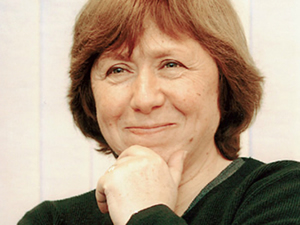Aan de Wit-Russische schrijfster en onderzoeksjournaliste Svetlana Alexandrovna Alexievich werd gisteren in de Frankfurter Paulskerk de Friedenspreis des Deutschen Buchhandels uitgereikt. Zie ook alle tags voor Svetlana Alexievich op dit blog.
Uit: Zinky Boys: Soviet Voices from the Afghanistan War
“I never want to write another word about the war, I told myself. Long after I’d finished “War is not a Woman”, a book about World War II, I could still be upset by the sight of a child with a nosebleed.
Out in the country I couldn’t bear to watch the fishermen cheerfully throwing their catch on to the sandy riverbank. Those fish, dragged up from the depts of God knows where, with their glassy, bulging eyes, made me want to vomit. I dare say we all have our pain threshold – physical as well as psychological. Well, I’d reached mine. The screech of a cat run over by a car, eventhe sight of a squashed worm, could make me feel I was going mad. I felt that animals, birds, fish, every living thing had a right to a life of its own. And then all of a sudden, if you can call it suddenfor the war had been going on for seven years…
One day we gave a lift to a young girl. She’d been to Minsk todo some food shopping for her mother. She had a big bag with chicken heads sticking out, I remember, and a shopping-net full of bread, which we put in the boot.
Her mother was waiting for her in the village. Or rather, standing at her garden gate, wailing.
‘Mama!’ The little girl ran up to her.
‘Oh, my baby. We’ve had a letter. Our Andrey in Afghanistan.
Ohhh… They’re sending him home, like they did Ivan Fedorinov. A little child needs a little grave, isn’t that what they say? But my Andrei was as big as an oak and over six foot. “Be proud of me Mum, I’m in the Paras now,” he wrote to us. Oh, why? .
Why? Can anyone tell me? Why? ”Each substance of agrief hath twenty shadoms.’ (Richard II) Then, last year, something else happened.
I was in the half-empty waitingroom of a bus station. An officer was sitting there with a suitcase, and next to him there was as kinny boy who you could tell from his shaved head was a soldier.
The young soldier was digging in a plant pot (a dryold ficus, Iremember it was) with an ordinary kitchen fork. A couple of simple country women went and sat next to them and, out ofsheer curiosity, asked where they were going, and why, who were they? It turned out the officer was escorting the soldier home.

Svetlana Alexievich(Stanyslaviv, 31 mei 1948)
